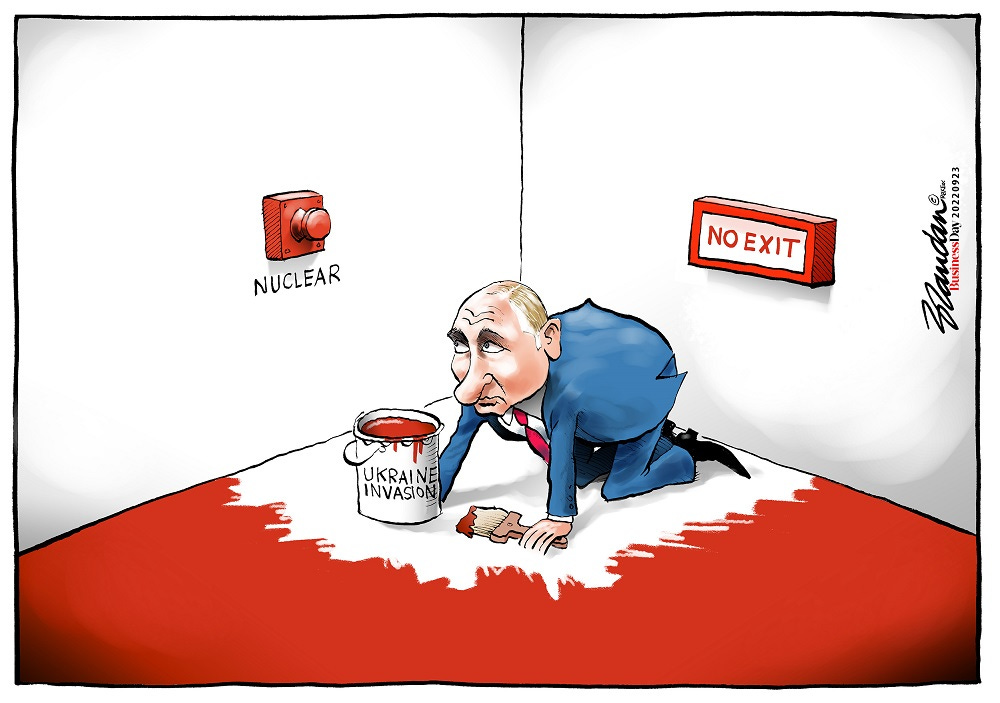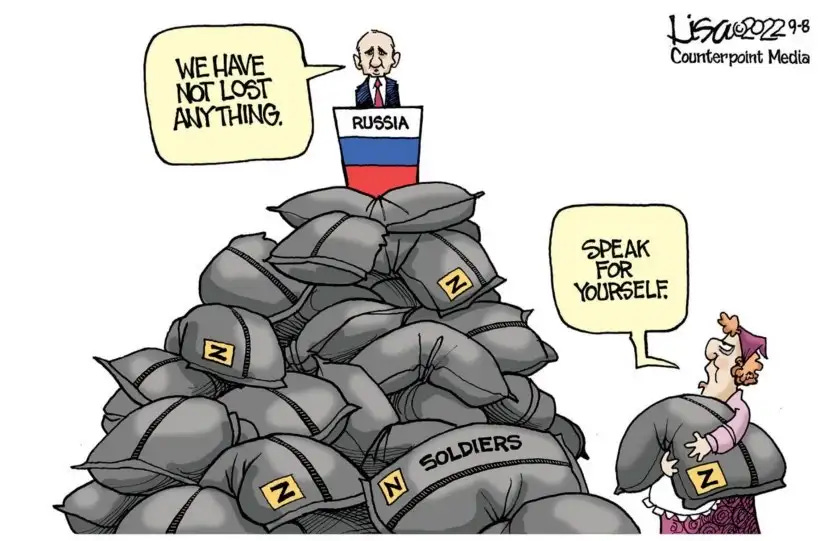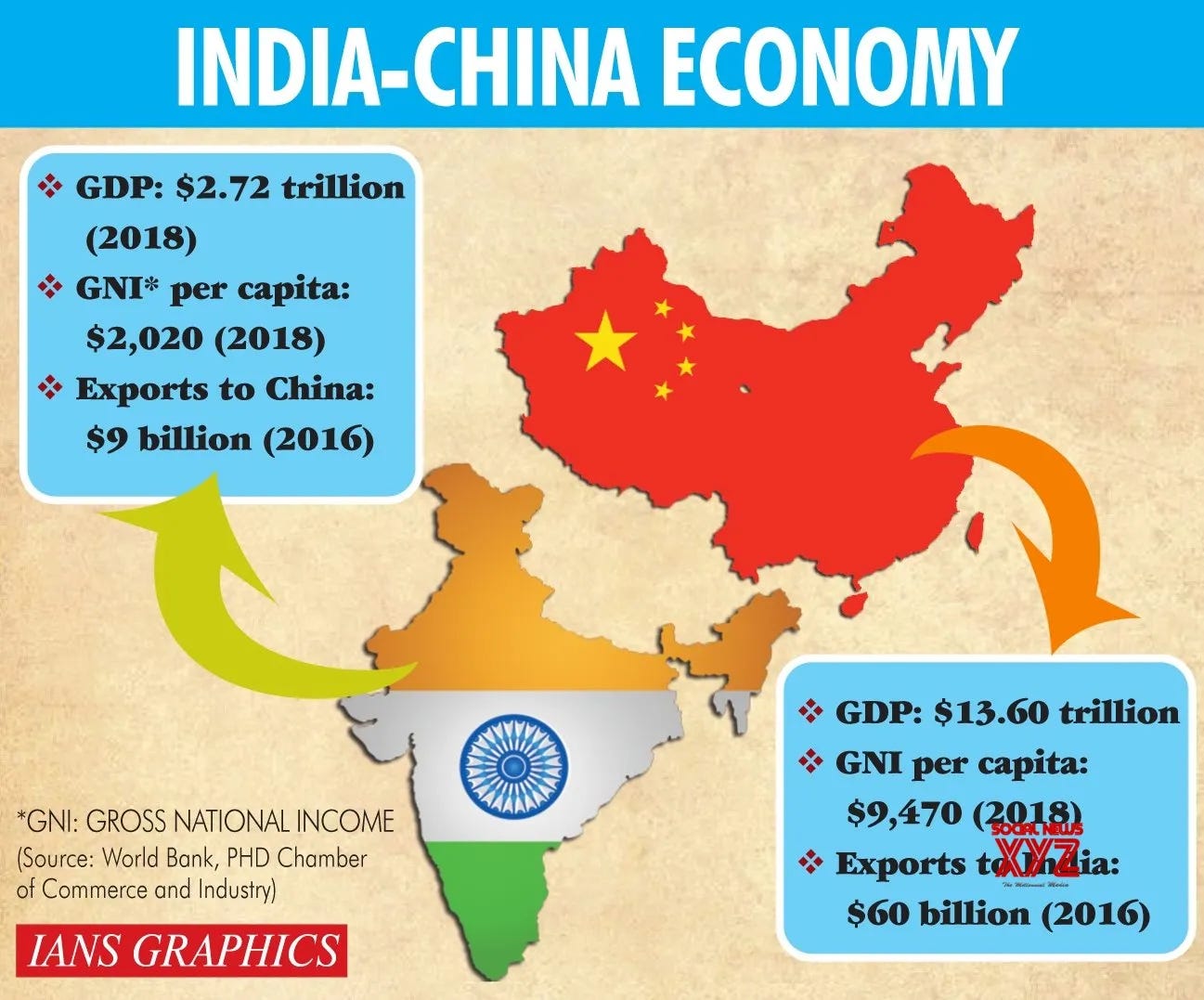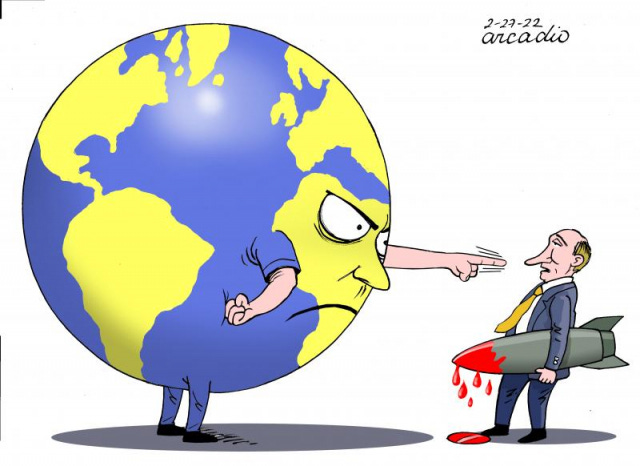What comes next, after Ukraine wins?
Is the Rules-Based, International Order strategizing?
As we all put Thanksgiving, 2022 in the rearview mirror, let’s not stop counting our blessings and adding to the list of things to be thankful for. To build on this theme, one of the globe’s and our nation’s most serious national security threats, Putin’s Russia has destroyed its previous status, as a top-tier, global power. That coupled with the recent open-ended commitment by NATO and other allies to support the courageous and capable Ukrainian military as long as needed, is indeed something to be grateful for.
As recent expert reporting confirms, aid to Ukraine is the bargain of the century for those of us pitching in. Threats to diminish or halt our commitment Ukraine cannot be justified via any analytical methodology, fact or reason. Not only must we see Ukraine through to booting Putin’s thugs out of Ukraine, but like post WWII, we must apply our resources towards an improved, rules-based, international order that mitigates the risks of what comes next.
Putin is daily reducing his offensive power by gross incompetence, corruption-induced failure in weapon’s systems, and a feckless military more capable of genocide against civilians than against any potential army. Putin is also setting off a more dangerous global threat, yet unaddressed… chaos in the global power and economic paradigm.
For experienced operators, introducing chaos into a situation provides a great many opportunities to expand their successes. For less capable or incompetent players, chaos introduces vulnerabilities that have second and third order effects of unintended consequences. To frame this more simply, Russia’s demise changes the calculus of other powers such as China and India. Both Xi in China and Modi in India are ambitious for power. Both now see themselves as primary contenders on the global stage, Xi especially. The question is, what role do they seek to fill now that Putin’s Russia occupies a far lower rung on the power ladder.
Xi, is on a path that has been demonstrably aggressive and violates every human’s right, associated with that path. Xi, arrogantly wields power for his own selfish purposes. Modi does the same but is playing the role ambiguously. His future role is in flux but is currently suspect to the nations of the rules-based, international order. Modi’s actions, quite often don’t match his words. Herein lies our dilemma. Both nations play an important role in the global economy, which has been under stress since COVID raised its ugly head in China. Balances of power, have also been made worse with Putin’s genocidal aggression and the now waning, peak of global populism.
Putin, Xi and Modi are linked symbiotically, as are all three with the rest of the world. Russia’s fossil fuels, weapons and grain production play an important role in the global economy and security stability. These and other commercial sector issues, play critical roles in the stability of China and India. This is how chaos is introduced into the equation. China and India both must have access to Russia’s fossil fuels to power the industry that makes them essential to the global economy. Both Xi and Modi, also have a strong dependence on Russia’s weapons and related military systems.
The world depends on both China and India for a variety of reasons, not the least of which is manufacturing. The world also depends on India fulfilling her role in managing Xi’s aggression. To date, she has been somewhat reliable but, the critical nature of India’s dependence on Russian fuel and weapons, clouds the picture of whether she will remain dependable. India, another strong grain producer, also depends on Russian/ Indian manipulation of global grain markets. China, already inadequate in supplying reliable power to her manufacturing sector, is dependent on Russian fuels and weapons. The world, especially in emerging nations, is dependent on Russian and Ukrainian grain to feed the starving. By most estimates, there are at least 350 million people, food insecure and dependent on that grain for their literal survival. On a scale even worse than Russia’s current Ukraine strategy to use starvation, Putin’s grain agenda, risks even more geo-strategic instability.
It takes years, sometimes generations to achieve a functioning stability and is dependent on countless factors. Everything Putin has and continues to do in Ukraine undermines most of the primary factors of stability, power and essential needs. A failure to achieve a strategy for “what comes next” with all nations and collective security organizations, runs the risk of upsetting global stability on a level unseen since WWII. Allowing this to occur by not taking a proactive approach by the RBIO/ rules-based, international order would almost certainly induce unmanageable chaos. Post Ukraine, there will be a serious twist in the ongoing realignment of global power paradigms. Making it worse by not strategizing, should not be a consideration.
The main focus areas of any strategy to manage, “what comes next” must address the fears of both Xi and Modi regarding the poor, ineffective weapons and weapon systems they have depended on Russia for. Any animal, person, nation or alliance becomes insecure to the point of poor decision making, when their perception of their security is threatening. Both China and India purchase in excess of 60% of the weapons from Russia and their domestic manufacturing depends on replicating those systems. Both, having watched Russia’s systems fail miserably in Ukraine, must be beyond anxious about their own security, largely dependent on Russian systems.
Both Xi and Modi are well aware that not only does the world have a symbiotic relationship with their commercial sectors, but both also know that the leverage they have in those relationships is dependent on fuel to drive manufacturing, most importantly, Russian fuels.
Finally, India, another significant grain producer, has deep concerns over their inability to control grain pricing without coordination with Russian and Ukrainian grain producers. This currently includes countless tons of Ukraine’s grain, stolen by the Russian military during their invasion.
Although I have just hit the highlights regarding a couple of primary players and their most critical issues, there are countless, potentially destabilizing, other issues to work on as well.
After looking at the primary challenges to managing potentially dangerous chaos, post Ukraine, it’s incumbent on all global leaders, especially those of significant nations and organizations, to put together a strategy to ensure a stronger, more moral and resilient, RBIO. There is no solution that depends exclusively on any one or handful of nations. If we want to begin mitigating the thuggery of authoritarians, despots and populists, we must acknowledge that it is a collective effort… or else, we will fail.
The bottom line to today’s article is that now, not tomorrow is the time that we must address the impending chaos. Like all power, when there comes a vacuum, there will always be those competing to fill it. Most of those competitors don’t have everyone’s best interests at the forefront. The RBIO, must act, prudently and proactively before the Xi, Putin, Bolsonaro, Myanmar junta, Modi, Orban’ or any other similar types act first.
My very best for your coming week,
Paul







RE: Chaos as strategy - Peter Pomerantsev has some interesting observations on the Russian strategy of 'decomposition' as developed and perfected in East Germany at the end of the Cold War. Russia has for decades used chaos-as-strategy to their advantage in their psyops and cyberops, since they realise that it's much easier to break things than mend them. But as you note, they may have thrown one too many stones in their Crystal Palace.
Thank you for the link to your article on Ukrainian narrative identity - very interesting indeed. I also have found the push towards a stronger Ukrainian identity focus for Russian speaking Ukrainians very interesting.
Ukrainians have also been exceptionally skilled at identifying shared meaning/identity with the (what remains of) the liberal West and building a pro-Ukrainian Western audience.
I completely agree with your implicit argument that the USG has a LOT to learn from the Ukrainian skilful handling of narrative and messaging.
This article gives a succinct summary of the high-level concepts at the heart of narrative warfare theory, and I'm glad to have your current state-of-theory synopsis here.
I've been busy working at a lower level - identifying specific strategic narratives and specific narrative strategies in the US and the UK media which support or challenge their respective governments' approach to the conflict.
Emma Bucher's 'War of Narratives' piece in RUSI identified a number of strategic narratives appearing in the UK/US press which I'd also noted, and I was glad that Prof Maan shared the link. It's a big world, and networks need dense linkage to benefit their members...
A favorite piece illustrating a prime narrative strategy - the summary of the meme war for Ukraine which appeared in Daily Kos (here, if you haven't already seen: https://www.dailykos.com/stories/2022/12/1/2139261/-How-Ukrainians-have-fought-back-with-humorous-war-related-memes-from-Saint-Javelin-to-NAFO)
BTW, Prof Ben O'Loughlin has particular expertise in Ukraine - I hope you'll get a chance to meet him when he's in the US this winter.
One last note on your Ukrainian narrative identity - very fruitful think piece. I followed your logic and terminology throughout...with one exception. I'm not sure I know the meaning of 'meaning'....not trying to be difficult here (it comes to me naturally!), but I think 'meaning' plays such a key conceptual role in your argument that it's worth expanding in future essays so that interested folks like me can follow the logic everywhere it goes.
Cheers, Maggie